| Listing 1 - 10 of 22 | << page >> |
Sort by
|
Book
ISBN: 1841717398 Year: 2006 Publisher: Oxford : John and Erica Hedges,
Abstract | Keywords | Export | Availability | Bookmark
 Loading...
Loading...Choose an application
- Reference Manager
- EndNote
- RefWorks (Direct export to RefWorks)
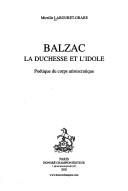
ISBN: 2745304526 Year: 2002 Publisher: Paris Honoré Champion
Abstract | Keywords | Export | Availability | Bookmark
 Loading...
Loading...Choose an application
- Reference Manager
- EndNote
- RefWorks (Direct export to RefWorks)
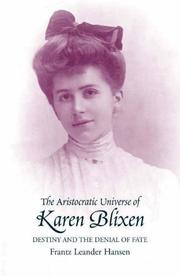
ISBN: 1903900328 Year: 2003
Abstract | Keywords | Export | Availability | Bookmark
 Loading...
Loading...Choose an application
- Reference Manager
- EndNote
- RefWorks (Direct export to RefWorks)
Book
ISBN: 0191861758 1282948148 9786612948145 0820337323 9780820337326 9780191861758 9780820335728 082033572X 0820346020 Year: 2011 Publisher: Athens [Ga.] : University of Georgia Press,
Abstract | Keywords | Export | Availability | Bookmark
 Loading...
Loading...Choose an application
- Reference Manager
- EndNote
- RefWorks (Direct export to RefWorks)
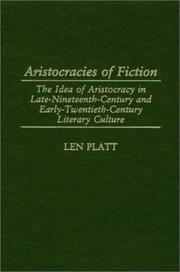
ISBN: 0313316732 Year: 2001 Publisher: Portsmouth Greenwood
Abstract | Keywords | Export | Availability | Bookmark
 Loading...
Loading...Choose an application
- Reference Manager
- EndNote
- RefWorks (Direct export to RefWorks)
Aristocracy (Social class) in literature --- English literature --- Literature and society --- History and criticism --- History
Book
ISBN: 3031411412 3031411404 Year: 2023 Publisher: Cham, Switzerland : Palgrave Macmillan,
Abstract | Keywords | Export | Availability | Bookmark
 Loading...
Loading...Choose an application
- Reference Manager
- EndNote
- RefWorks (Direct export to RefWorks)
Science, Medicine, and Aristocratic Lineage in Victorian Popular Fiction explores the dialogue between popular literature and medical and scientific discourse in terms of how they represent the highly visible an pathologized British aristocratic body. This books explores and complicates the two major portrayals of aristocrats in nineteenth-century literature: that of the medicalised, frail, debauched, and diseased aristocrat, and that of the heroic, active, beautiful ‘noble’, both of which are frequent and resonant in popular fiction of the long nineteenth century. Abigail Boucher argues that the concept of class in the long nineteenth century implicitly includes notions of blood, lineage, and bodily ‘correctness’, and that ‘class’ was therefore frequently portrayed as an empirical, scientific, and medical certainty. Due to their elevated and highly visual social positions, both historical and fictional aristocrats were frequently pathologized in the public mind and watched for signs of physical excellence or deviance. Using popular fiction, Boucher establishes patterns across decades, genres, and demographics and considers how these patterns react to, normalise, or feed into the advent of new scientific and medical understandings.
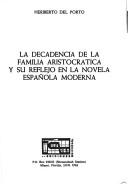
ISBN: 0897293029 Year: 1984 Publisher: Florida Universal
Abstract | Keywords | Export | Availability | Bookmark
 Loading...
Loading...Choose an application
- Reference Manager
- EndNote
- RefWorks (Direct export to RefWorks)
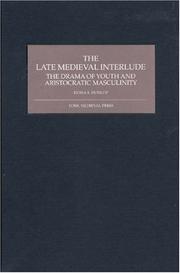
ISBN: 1903153212 9786612185571 1282185578 1846155614 Year: 2007 Publisher: [Woodbridge, Suffolk, UK?] : York Medieval Press,
Abstract | Keywords | Export | Availability | Bookmark
 Loading...
Loading...Choose an application
- Reference Manager
- EndNote
- RefWorks (Direct export to RefWorks)
Sensitive study of the 15/16 century interlude, focussing on one of its major concerns, the depiction of male aristocracy and the development to maturity. The commercial theatre of the late sixteenth century is often credited with introducing its audiences to new modes of thought about the self, society and the nation, making them conscious that the self is performed, as an actor performs a role. Yet the earlier interlude drama, originally performed in households and other institutions of the late fifteenth and sixteenth centuries, indicates that the late medieval period was fully aware of the theatricality of identity. This book argues that ideas of performance inform the concepts of aristocratic masculinity developed in the plays 'Nature', 'Fulgens and Lucres', 'The Worlde and the Chylde', 'The Interlude of Youth' and 'Calisto and Melebea'. It examines how the depiction of young male aristocrats in these texts is shaped by ideas of male youth constituted in the middle ages, and shows them as failing or succeeding to perform an adult noble masculinity in the aristocratic body and in aristocratic household. The book also suggests ways in which the plays offer discreet praise and censure of the manner in which their noble patrons performed as aristocrats. Throughout, it brings out the subtle qualities of the interludes, which, the author shows, have been unjustly neglected. Dr FIONA S. DUNLOP is Research Associate of the Centre for Medieval Studies, University of York
Aristocracy (Social class) in literature. --- Drama --- Interludes. --- Young men in literature. --- History and criticism. --- Drama, Modern --- Dramas --- Dramatic works --- Plays --- Playscripts --- Stage --- Literature --- Dialogue --- Aristocracy in literature --- Philosophy
Book
ISBN: 8496045390 Year: 2006 Publisher: Madrid : Editorial Pliegos,
Abstract | Keywords | Export | Availability | Bookmark
 Loading...
Loading...Choose an application
- Reference Manager
- EndNote
- RefWorks (Direct export to RefWorks)
Aristocracy (Social class) in literature. --- Fiction --- Fiction --- Aristocratie (Classe sociale) dans la littérature --- Roman --- Roman --- History and criticism. --- History and criticism. --- Histoire et critique --- Histoire et critique
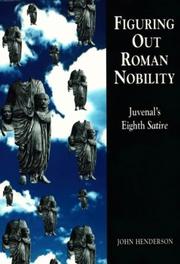
ISBN: 0859895173 Year: 1997 Publisher: Exeter University of Exeter press
Abstract | Keywords | Export | Availability | Bookmark
 Loading...
Loading...Choose an application
- Reference Manager
- EndNote
- RefWorks (Direct export to RefWorks)
Aristocracy (Social class) in literature --- Families in literature --- Nobility in literature --- Nobility --- Verse satire, Latin --- History and criticism --- Juvenal. --- Rome --- In literature.
| Listing 1 - 10 of 22 | << page >> |
Sort by
|

 Search
Search Feedback
Feedback About UniCat
About UniCat  Help
Help News
News